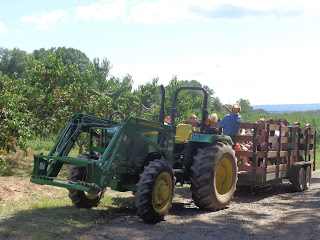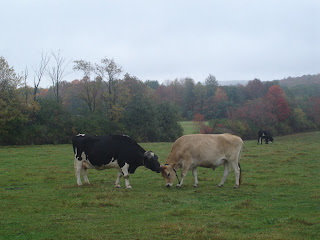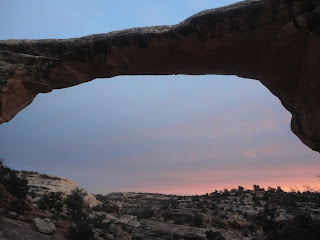
A sun-kissed peach at Demarest Farm in Hillsdale, New Jersey. In my opinion, more satisfying than the latest version of any iPhone.
Canned peaches were a marvel to homesteader Mary Bee Cuddy in the Hillary Swank and Tommy Lee Jones film, The Homesman, portraying the harsh, isolating life on the Nebraska frontier in the 1800s. A peach pie was a taste of home back in the East, something a potential husband Mary Bee was trying to attract might find pleasing. In Isabel Allende's California gold rush novel, Daughter of Fortune, she wrote of the fortune seekers, "They would pay any price for the apple pie that gave them a moment's respite from homesickness."
Whether it's the latter half of the 19th century or 2015, there's something so nourishing to the soul like a piece of pie, especially made at home or from a farm. I feasted on a fresh blueberry pie this Columbus Day weekend purchased at Old Hook Farm in Emerson, New Jersey, which my sister described as very "Little House on the Prairie." I could see this on Caroline Ingalls' windowsill for cooling at Plum Creek. This is been made into another "sale" weekend, yet another excuse to go shopping and consume. Home Depot's advertisement had a banner "Take on Fall" and below it "Let's Get Upgraded." When I hear upgraded I always think, buy things you don't truly need. I'd take a piece of pie at the farm any day over time at the shopping mall. This is my take on fall.
August was our first time peach picking, which we did at Demarest Farm.
I ate more peach melba than I ever did in my life this summer. I adored too peaches for snacking and my husband Steve's peach crisp.
In the BBC adaption of Flora Thompson's Lark Rise to Candleford, Laura Timmins describes, "The last few days of summer were a time of headiness and plenty....while the Lark Rise men brought home the harvest." Most of us in modern life have no part in harvesting. That can be a good and/or bad thing depending on your perspective. We're lucky and grateful to have farmers in our lives supplying the good and plenty. We loved the variety of our CSA with Abma's Farm in Wyckoff, New Jersey, produce plus add-ons of eggs, dessert bread and Tomasello wine. Here's an update of what we received. For 20 weeks, we paid, $440 for the produce, $40 for half a dozen eggs weekly, just under $300 for the wine and the bread, which I signed up for the third week, was a big splurge at $7.25 a loaf. So the weekly photos represented about $45 worth of food. Considering all the meals we got out of it, we considered it worth the cost. We could spend that much going out for one meal, which we rarely do anymore, save for farm lunches maybe once a week. We may just do produce and eggs next year, possibly bread. I really enjoyed trying the wines but am not a big drinker.
Week 12: Swiss chard, heirloom tomatoes, garlic, beets, leek, lettuce, cherry peppers, cherry tomato pints, with eggs, cornbread and chardonnay. I always took a mix of brown and white eggs and think of one of my favorite episodes of Little House on the Prairie, Country Girls, when Harriet Oleson tells Caroline that brown eggs are 4 cents less a dozen, which Caroline victoriously refutes.
Week 13: Cubanelle peppers, carrots, corn, cherry tomatoes, plum tomatoes, lettuce, leek, with eggs, apple banana fusion bread (I swapped the offered zucchini bread to try a new one), and riesling.
Week 14: Bok choy, kohlrabi, lettuce, corn, garlic, green beans, heirloom tomatoes, with eggs, Morning Glory bread (with carrots, coconut and raisins) and Rkatsiteli white wine.
Week 15: Leek, Swiss chard, lettuce, bok choy, tomatoes, radishes, peppers, cherry tomatoes, with eggs, pumpkin bread and Autumn Leaf red wine.
Week 16: Tomatoes, leek, corn, lettuce, bell peppers, and a watermelon from a Sussex County farmer, with eggs, apple cinnamon bread and pinot noir.
Week 17: Tomatoes, zucchini, cucumber, collard greens, lettuce, arugula, and peaches from a fellow farmer, with eggs, cranberry bread and sangiovese, which went so well with baked ziti on chilly, rainy night.
Week 18: Tomatoes, zucchini, green beans, Swiss chard, a head of lettuce, arugula, radishes, apples from Sunshine Orchards in Milton, New York, with eggs, banana chocolate chip bread and a cabernet reserve.
Week 19: Tomatoes, zucchini, green beans, eggplant, a head of lettuce, arugula, apples and butternut squash. We had a choice of spaghetti, butternut or acorn squash. With eggs, zucchini walnut bread, and a vintage port.
I cannot wait for butternut squash soup. I know pumpkin products get all the glory these days, but I love other fall fruits and vegetables equally: squashes, cranberries, pomegranates, apples and such.
Week 20: Kale, arugula, radishes, a leek, green beans, acorn squash, cherry tomatoes, apples, with eggs and pumpkin chocolate chip bread, and a Broomstick Brew wine. Everyone got to pick out a mum: yellow, purple or orange. It was so sad picking this up for the last time!
I celebrated the autumn equinox at Demarest Farm my mom and daughter Grace with an army of people who came for apple picking.
We just came for lunch, sharing cheese lasagna, sweet potatoes and spinach, with pumpkin cheesecake and hazelnut coffee.
"Autumn was her happiest season. There was an expectancy about its sounds and shapes: the distant thunk pomp of leather and young bodies on the practice field near her house made her think of bands and cold Coca-Colas, parched peanuts and the sight of people's breath in the air. There was even something to look forward to when school started - renewals of old feuds and friendships, weeks of learning again what one half forgot in the long summer. Fall was hot-supper time with everything to eat one missed in the morning when too sleepy to enjoy it.” - Harper Lee, Go Set a Watchman
There's a television ad for Campbell's with a young couple in the kitchen both glued to their handheld devices while eating dinner. The woman's foot softly touches his, and the announcer says, "Nothing like a good quick meal to bring two people together" and their meals are for "real, real life." So have we have all been reduced to not human beings but consumers, so mindlessly looking at our gadgets?
While there's so many wonderful things about technology, I think these devices play too heavy a hand in our world, and they've become an actual extension of our body: arm, hand, iPhone. How can we appreciate our food while looking at a device?
Nearby our lunch table was a group of teenage girls, each one with a phone in their hand that they were looking at the entire time we were there. I told my mother of my concern of raising our daughter amidst this mob mentality of phone dependency. I think of an exchange between characters on Lark Rise to Candleford, with Alf resistant to the machines that would soon change his world.
"It takes courage to move with the times, Alf. " - Gabriel
"It takes courage to move with the times, Alf. " - Gabriel
"What I've been taught, sir, is sometimes it takes courage to stand still." - Alf
I think we need to put the devices down and get back to savoring our food, interacting with one another, looking not down but at this beautiful world around us, and letting our minds run free instead of being distracted. What's happening now, especially a generation taken over by companies selling these devices and contracts, doesn't feel like progress in the least.
When I completed the four seasons of Lark Rise to Candleford following the closely knit agricultural community in England in the late 1800s, I felt a longing for more, since it was a world I craved. I loved simple things about it, like all the tea times and meals on Dorcas Lane's fine green and white china. No one ignoring each other looking at their phones here. John Dagleish, who plays Alf Arless, said that now "Everything is kind of sound bites and newsflash and flashplay. Everything sort of bombards you. It was a much slower pace of life. People take their time over their thoughts, over their words. It's definitely a lost kind of innocence that they had. We're bombarded with so much information now that we've sort of lost a bit of our imagination maybe and that magic of living off the land and supporting each other."
I think farms get so mobbed during the autumn because as a people we long to reconnect with the magic of living off the land, if at least for a little while. I always savor a slower pace of life when I lunch at the Abram Demaree farm stand in Closter, New Jersey. I always call this a bit of a secret farm, a hidden gem that serves up comfort food.
I was craving the simplicity of grilled cheese with tomato.
Fresh out of the oven chocolate chip cookies. I've seen shows where they are trying to sell houses and they bake these at open houses to invoke the feeling of home. HGTV says "the intoxicating scent brings back childhood memories for many." For all the materialism in our society, isn't it so that things like simple gifts from our kitchens really pull at our heartstrings?
On the way home, we picked up the blueberry pie and apple cider at Old Hook Farm, where I admired the fall decorations. Isn't autumn the most cheerful, cozy time? I think like Scout, now called Jean Louise in her adult life in Got Set a Watchman, for many of us it's our best season.
On the way home, we picked up the blueberry pie and apple cider at Old Hook Farm, where I admired the fall decorations. Isn't autumn the most cheerful, cozy time? I think like Scout, now called Jean Louise in her adult life in Got Set a Watchman, for many of us it's our best season.
































